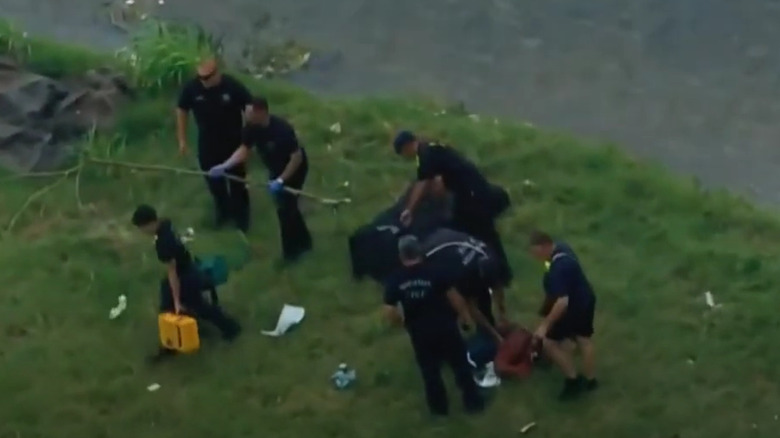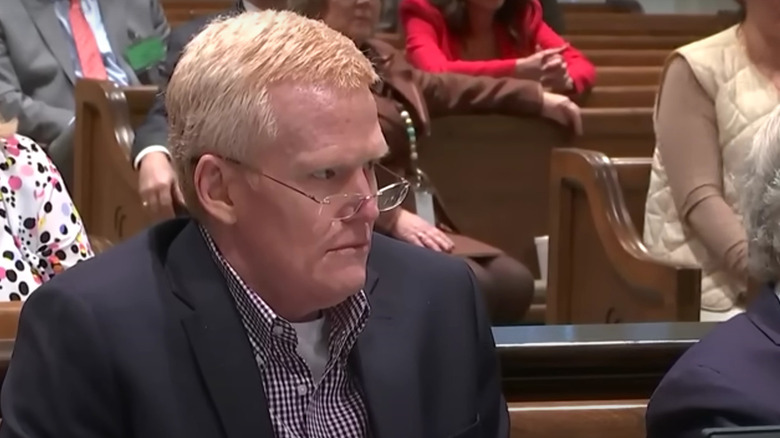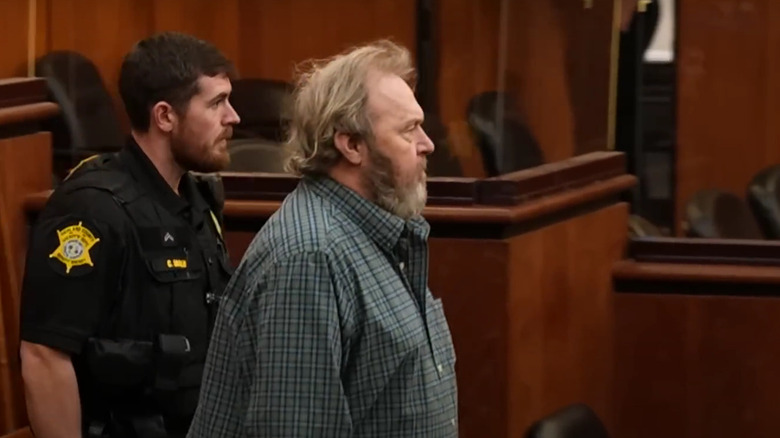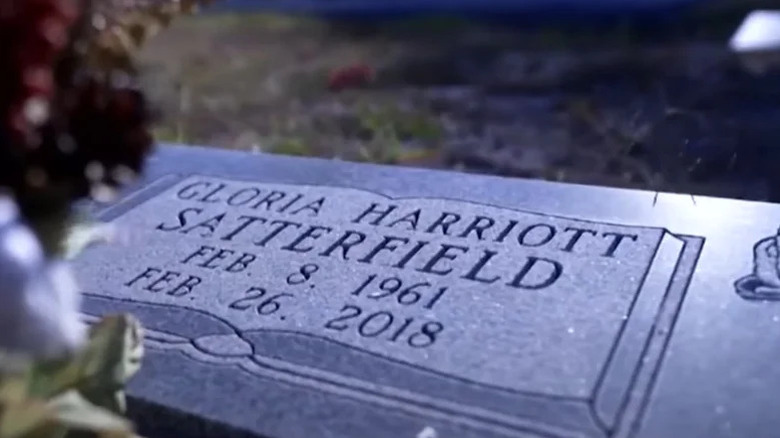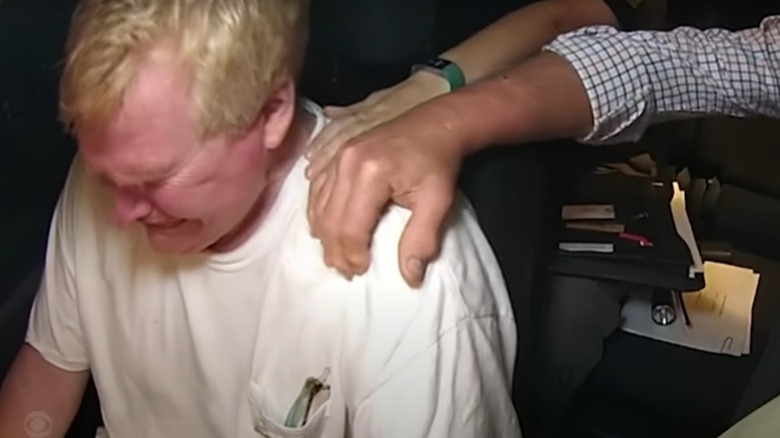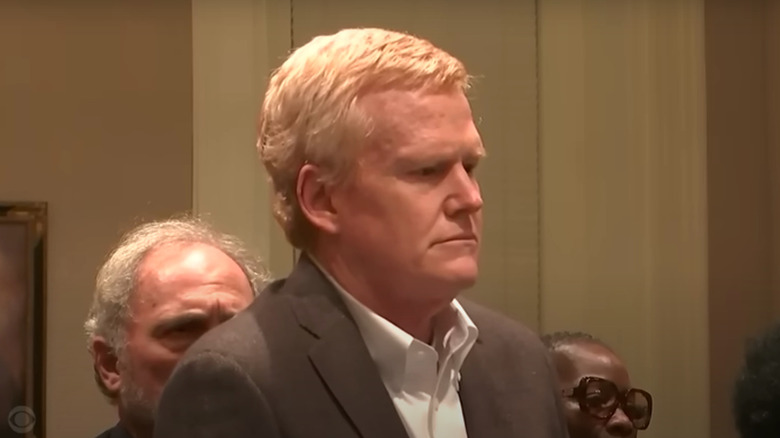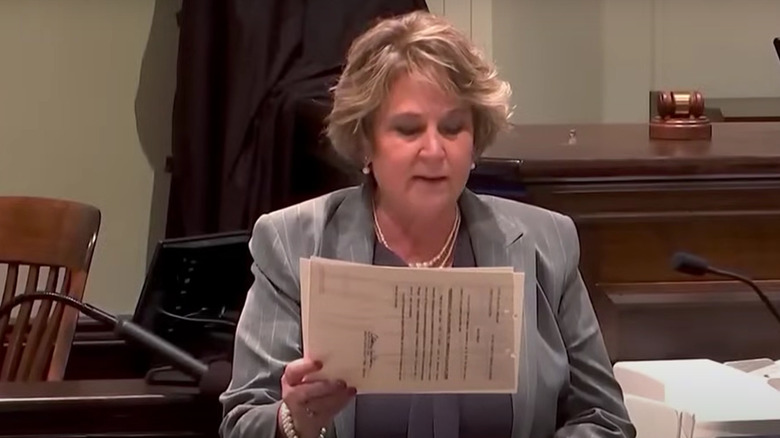Bizarre Things That Never Made Sense About The Alex Murdaugh Case
The "Murdaugh Murders" shocked the nation in 2021, when the wife and son of a prominent South Carolina attorney were found slain. Maggie and Paul Murdaugh's murders appeared to languish unsolved for over a year until the arrest and indictment of Alex Murdaugh: Maggie's estranged husband, Paul's father, and the head of a family that had held a commanding role in the South Carolina legal establishment for generations.
Alex Murdaugh was convicted of the murders in a 2023 trial, but that verdict was not the end of the story, nor did it answer all the questions the public had about the attorney and his crime. Not only had he been siphoning impressive sums of money from his clients, but the family also had ties to a handful of suspicious deaths. A boat crash, a fatal fall, a hit-and-run: Bad luck, or worse, seemed to stalk those connected to the Murdaughs. Few people doubt that there's blood on Alex Murdaugh's hands — but we may not yet know how much.
What was the whole story in the boat crash?
In 2019, two years before he was murdered by his father, Paul Murdaugh was involved in a deadly boating accident. The crenellated coast of South Carolina is popular with boaters, especially for people lucky enough to have a family island, as the Murdaughs did. In February 2019, Paul and a cohort of similarly underage friends decided to meet at Murdaugh Island and pregame before heading to a party on another nearby island via the Murdaugh family boat. (Crime scene photos show a depressing amount of Michelob Ultra in the cooler taken from the boat.)
After spending a few hours at the party, the group headed to the city of Beaufort to continue drinking on land, successfully being served in a bar. According to the other passengers, Paul was acting drunk and erratic, but as it was his family's boat, he still drove. He alternated between driving in circles and fighting with his girlfriend until, at 2:20 a.m., the boat struck a bridge, and passenger Mallory Beach was thrown from the craft.
Beach's body was recovered from the water several days later, about five miles downstream of the crash site. Meanwhile, images of the boat show serious structural damage and a significant amount of blood on the floor, and Murdaugh's blood showed a high .24 blood alcohol level several hours after the incident, which is triple the legal limit. Paul Murdaugh was indicted for felony charges in Beach's death and injuries to other passengers, but died before facing trial.
Did Alex Murdaugh try to shift blame in the boat crash?
The story of the boat crash as it can be pieced together from the accounts of surviving passengers is fairly damning of Paul Murdaugh, but a lawsuit filed by survivor Connor Cook makes the rest of the family out to be complicit in Paul's wrongdoing. Per the court documents, Paul bought alcohol using his older brother Buster's ID and his mother's credit card, even though that both knew he tended to drink to excess — and after the boat crash, Alex may have tried to shift blame from his son onto another passenger.
At the hospital, Alex allegedly approached each survivor — some of whom, like Cook, were injured — and told them to say they didn't know who had been driving the boat. (Not perhaps the most credible lie, given the size of the boat, but these were his instructions.) Alex Murdaugh hired an attorney for Cook, though that attorney turned out to be his old college buddy and Paul's godfather.
The documents go on to allege that the Murdaughs tried to blame Cook himself for the crash, using their influence and a targeted rumor campaign to turn the community's focus on Cook, not on Paul Murdaugh. Cook had been told to be silent, per this theory, to avoid too many people hearing right away that Paul had been at the tiller. Cook withdrew the suits in 2024, leaving questions about the parties' relative culpability formally unanswered.
Why was Maggie Murdaugh suspicious?
Alex Murdaugh and his wife Maggie had not been getting along at the time of the murders and were living apart, with Maggie holing up at the family beach house. So when her husband texted her to meet him at the family home in Islandton, about an hour from the beach house, Maggie didn't feel like going, only agreeing when Alex told her his father was dying and that this was her chance to say goodbye. Maggie countered with an offer to meet at the hospital, but no: Alex insisted she meet him at the Murdaugh home in Islandton, sometimes called the Moselle property from its street address, so they could drive to the hospital together.
Maggie vented in a text to a friend, calling Alex's behavior "fishy." And granted, anyone who reads about the case quickly comes to feel that everything Alex Murdaugh does is fishy, but why was Maggie suspicious of him — and why did she go to the Islandton house against her better judgment? When she arrived, she left the car running, presumably expecting to leave again right away, but she never made it back to the car: Alex's machinations were even more sinister than she realized.
Why did an experienced prosecuting attorney do such a bad job covering his tracks?
Alex Murdaugh was an experienced prosecuting attorney who ostensibly knew the South Carolina legal system inside and out. He knew, or should have known, what investigators would look for and at least some of the tools they could use to probe the murders and his involvement, and yet even with his connections and experience, he was caught and convicted. And while that's good for the interests of justice and the safety of people who might pass into his orbit, it does raise the question of why the murders were so sloppy, and Murdaugh's defense so weak, that the presiding judge at his murder trial went on the record to comment that "the evidence of guilt is overwhelming."
Gun casings from the murders matched others found at the property, indicating that the murder weapon had been fired there before and was therefore likely a family gun. Murdaugh's voice appeared on a Snapchat video Paul took shortly before his death. Cell phone location data undercut his account of his movements. We can speculate that perhaps Alex Murdaugh wasn't thinking clearly due to his acknowledged opioid addiction and, perhaps, the enormity of the crimes he planned. But until he sits for a tell-all interview, we won't know why an allegedly brilliant legal mind so badly bungled the highest-stakes situation of his life.
And why was he such a bad witness?
You don't have to take the stand in your own defense, and Alex Murdaugh knows this. The Fifth Amendment of the U.S. Constitution means that, among other provisions, prosecutors cannot call defendants as witnesses. Only the defense can choose for the defendant to take the stand, but if they do so, the defendant is subject to cross-examination by the prosecution. Murdaugh was a tarnished defendant — evidence of his financial crimes and opioid addiction was presented at his trial — answering for the murder of his own family. So why did he go on the stand, and why did his attorneys let him?
Jurors who spoke to the media after the trial confirmed that Murdaugh's testimony had hurt him. He acknowledged lying about his whereabouts, claiming not to have gone down to the kennels near which he'd found the bodies earlier in the evening. Cell phone data disproved this story, and Murdaugh's initial attempt at deceit seems to have made him generally hard to believe. His former prominence also hurt him, with one juror commenting that she saw his testimony as just another iteration of the courtroom performances he'd given throughout his career.
Why did Alex Murdaugh have his cousin shoot him in the head?
All families are different, but even with this caveat in place, it seems Alex Murdaugh came at his cousin with a big ask. Curtis Edward Smith was admittedly not just a distant cousin but also a friend and former client, so Murdaugh figured Smith was someone he could ask to please shoot him in the head by the side of a rural road in order to stage his death in a botched carjacking.
Roughly three months after Paul and Maggie's deaths, Murdaugh's law firm had formally accused him of financial wrongdoing. Given that the jig seemed to be up, he wanted to die in a way that would allow his surviving son Buster to collect on a $10 million insurance policy. As suicide often voids insurance policies, Murdaugh needed his death to be by someone else's hand — or at least appear to be. Smith was game, but the men whiffed the stunt, leaving Murdaugh shot in the head but still alive.
Murdaugh's tale of a carjacking fell apart under questioning. Smith maintained that while he had disposed of the gun, he had not shot Murdaugh intentionally: The gun went off as he tried to wrest the weapon from Murdaugh to prevent him from shooting himself. Both men would face charges in the incident, with Murdaugh's insurance fraud count going in the big pile and Smith's charges for, among other crimes, assisted suicide still pending as of the most recent news reports in early 2024.
Was Gloria Satterfield murdered?
One of the suspicious "other deaths" associated with the Murdaugh family was the demise of Gloria Satterfield, the family's long-term housekeeper. Satterfield fell and was injured at the Murdaugh family home (the same at which Paul and Maggie were murdered) in early February 2018, lingering a few weeks before dying on February 26.
Details of Satterfield's injuries are not publicly available, but the initial story, according to Alex Murdaugh, was that she had tripped over the family's dogs and fallen down the house's front steps. This later proved to be a lie, with the story concocted to get a bigger payout from the Murdaughs' insurance company. No autopsy was performed, and the coroner was apparently not notified of her allegedly accidental death on private property, and yet her death certificate attributes her death to "natural causes" — not the accidental death Murdaugh described.
Alex Murdaugh also attempted to swindle Satterfield's next of kin out of the settlement resulting from her death. He offered to look after her adult sons' interests in discussions with the insurance company, but then never gave them any of the money he received. The Satterfield sons eventually reached a settlement with Cory Fleming, Murdaugh's friend and associate who had involved himself in the case, and eventually received both the original payout and one from Fleming's firm's malpractice insurer.
Is Stephen Smith's death related?
Stephen Smith was a 19-year-old nursing student when he was found dead in the middle of a road in rural South Carolina in July 2015. Smith's death was initially ruled a hit-and-run, but in the summer of 2021, South Carolina police announced that they would be reopening the case as a homicide, explicitly citing information they had uncovered in the investigation of Paul and Maggie Murdaugh's murders.
Smith was openly gay, and both his mother and the Smith family attorney suspect that his sexuality may have made Smith a target. News reports indicate that Buster Murdaugh, who had been a classmate of Smith's, was mentioned in witness interviews in the initial investigation, though he had not been charged as of mid-2025. Buster wasn't the only Murdaugh with a rumored connection to Smith's death, though. Alex's brother Randy, also an attorney, called the family and offered to "help" in the aftermath ... and when Smith's mother drove by the area where his body was found, she saw Alex and Randy standing by the side of the road.
There was no apparent debris from a car impact near or on Smith's body, and the sheriff reporting his death to his parents initially said he had been shot. A policeman on the scene has claimed that the corpse appeared staged, and unlike in most car impact deaths, Smith's clothing was undamaged, and his shoes remained on his feet. The investigation continues.
What was the motive?
The prosecution in any murder case is not technically obligated to prove a motive, but realistically, their job is made much easier if they can point to a clear reason for a killing. Though the prosecutors were ultimately successful in the Murdaugh case, Alex Murdaugh's reasons for killing his wife and son remain open to speculation.
During the trial, the prosecution argued that Murdaugh's house of cards was on the verge of collapse: His law partner had confronted him about his financial misdeeds, and the walls were closing in. If Murdaugh could distract from his impending troubles by becoming the bereaved survivor of a decimated family, maybe the other problems would simply go away. If nothing else, he might buy himself some time. It's not a great plan — fraud law generally doesn't have a "bad things happened to me later" clause — but Alex Murdaugh was decidedly not a clever strategist at this point. The official version remains unsatisfying, but it's what watchers of this bizarre, labyrinthine case have to go on.
How did Alex Murdaugh think he'd get away with all the theft?
The financial stresses that allegedly provided the motive for Alex Murdaugh's murders of his wife and son were colossal by most people's standards. If he and his family had been found liable in the boat crash lawsuits, he might have been on the hook for $10 million. Additionally, Murdaugh had wrapped himself in a complex web of fraud schemes, bilking his employer and his clients alike.
Gloria Satterfield's death wasn't the only case in which Murdaugh had lifted money: It turned out he had set up a dummy bank account, made to look like it belonged to a structured settlement administrator, into which he had siphoned funds that belonged to his personal injury clients. This private account was also set up to receive litigation fees payable to Murdaugh's firm, not to Murdaugh himself, cutting the firm out of the financial loop. Murdaugh had even pulled local banks into his schemes, with one bank executive (and childhood associate of Alex Murdaugh's), Russell Laffitte, found guilty of helping Murdaugh conceal his financial misdeeds and allowing him to take out loans against accounts in his clients' names.
It's a complex web of crimes to keep afloat, but it seems Murdaugh needed the cash. According to the Independent, his drug addiction had gotten so bad (and his ability to bargain-hunt was so poor) that he was spending over $50,000 on opiates a week.
Why did Becky Hill meddle with the jury?
In May 2025, a strange coda to the sensational Murdaugh trial emerged. Becky Hill, the court clerk for the trial, was charged with a raft of crimes, including perjury, misconduct in office, and using her position for personal gain.
Hill allegedly had inappropriate contact with multiple jurors, advising them not to be deceived by Murdaugh's defense and commenting that the trial "shouldn't take long." Only a few months after the trial, Hill published a firsthand account of her role in the trial and observations, "Behind the Doors of Justice: The Murdaugh Murders." Hill then admitted to having partly plagiarized the book, which was pulled from publication, as well as simply fabricating a number of incidents. Hill is additionally accused of having used her office to promote the book, though perhaps her time would have been better spent actually writing it.
With the allegations of jury tampering by Hill now attached to the case, Murdaugh's lawyers petitioned the court for a retrial, arguing in part that Hill wanted Murdaugh to be convicted because that would help sell "her" book. This motion was denied, with the judge acknowledging that Hill had behaved foolishly and unethically but rejecting the argument that Hill's behavior had seriously affected the verdict.

